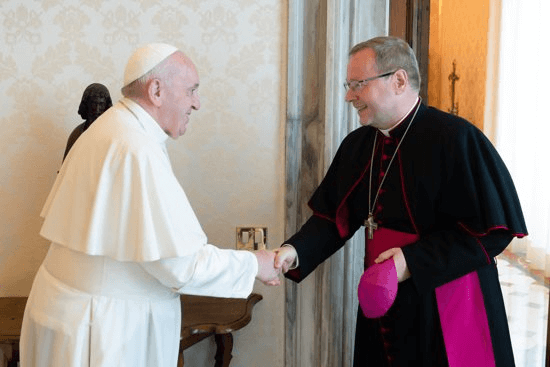Synodal Committee will refuse to obey the Vatican?
The south Bavarian city of Augsburg was historically recognized as the place of birth of Pope Francis’s beloved idolatry of the Virgin Mary under the deed “Mary, Undoer of Knots.” It is as well the post where the Augsburg Confession – the conviction professed by a lot of princes within the Catholic First Reich who embraced the Reformation of Martin Luther – was issued.
About 500 years afterwards, the German Bishops’ Conference (DBK), the collegial body of German Catholic bishops, would be convoking in Augsburg once again to debate the proposal of making a Synodal Council, a lasting body of bishops and temporality to rule the Catholic Church in Germany, as a division of its Synodal Way project.
The Vatican has since expressly proscribed the creation of a specified body, and Pope Francis himself knocked the concept.
Significant Meeting of Augsburg for the Catholic Church in Germany:
In a report by the National Catholic Register, the DBK would be getting together in Augsburg in February. 19 to 21 for their yearly spring plenary assembly, and among the all-important schedules to be talked about is the Synodal Council and whether or not they would go forward towards their establishment.
For this purpose, the bishops would be required to sanction the statutes of a “Synodal Committee” that presently lays the basis for the banned council. The citizens committee already held its 1st meeting in Nov last year, with an absolute majority of German bishops involved.
In the meantime, the lobby of the Synodal Way, known as the “Central Committee for German Catholics” (ZdK), already sanctioned the statutes in November. 25.
If the DBK would support the committee, it would efficaciously be an act of rebelliousness against Rome and the Roman Catholic Pope, which in turn could go to an instant schism.
Simply, if the German bishops closed up the lay lobby’s assets, or at least had a significant number of bishops controverting it, the Synodal Way could be believed lifeless on the water, arguing that the Vatican’s reprimands are effective.
The DBK stated that the assembly would “address more conditions on the Synodal Path of the Church in Germany”- an unclear word being widely understood as citing the conceivable approval of the Synodal Committee’s statutes, the Register explicated.
Although the statutes have far been anticipated, the DBK has not announced that balloting would fall out. All the same, the assembly’s exact schedule and whether or not a vote would be rolled – would just be brought out in a national catholic news conference with the DBK’s chairperson, Limburg Bishop Georg Bätzing, on the noon of the assembly.
Is ‘Synodal Committee’ a Problem for the Vatican?

Of all the difficult resolutions furthered by the Synodal Way, the Synodal Council has been the Vatican’s main interest.
At Leastwise 5, German bishops penned to Rome in Jan to show their care about the council’s establishment, with 3 upper-level Vatican officials reacting to the bishops stating that the suggested Synodal Council would sabotage the episcopal authorization “of teaching and ruling” by placing itself “above the agency of the German bishops’ conference.”
The letter, sanctioned by Francis in its particulars, underlined that no German physical structure could make such a council.
The Pope himself in person knocked the Synodal Way’s conception of an inadvertence committee in a Nov letter enclosed to 4 female lay assigns of the technological working party making the concept who have since resigned their posts in objection. In the letter, Francis stated that what the German bishops were doing was a menace to church integrity.
Not all German bishops consorted with the Synodal Committee, as at least four bishops breached orders from their pontifical fellows and previously closed up funding it with the German bishops’ apportioned stock.
Bishop Stefan Oster of Passau stated that his view and that of at least 3 colleague bishops was justified by Francis’s letter.
“As I read the letter with this explicitness, the Synodal Committee from the Pontiff viewpoint gets on the forbidden district,” Oster published in early Dec.
Among the bishops to look out for, the Register viewed, was Augsburg Bishop Bertram Meier, who was ascertained as the “man in the midst” for his supposed ambiguity.
He voted against a lot of the Synodal Way’s most barbed resolutions; he as well stressed the authenticity of the procedure and still gratingly knocked its knockers, like Oster, Cardinal Rainer Woelki of Cologne, Bishop Gregor Hanke of Eichstätt, and Bishop Rudolf Voderholzer of Regensburg.
Simply apart from the 4 ordinary – or sitting – bishops, a lot of auxiliary bishops have as well stated that they argued acquiring the Synodal Committee, specified as Cologne’s Bishop Dominikus Schwaderlapp and Augsburg’s Bishop Florian Wörner.
Whatever falls out in Augsburg, it would be expected to be a reclaim of the Vatican’s social approach to Germany, possibly by replicating its position by utilizing censure away from written or addressed warnings.
